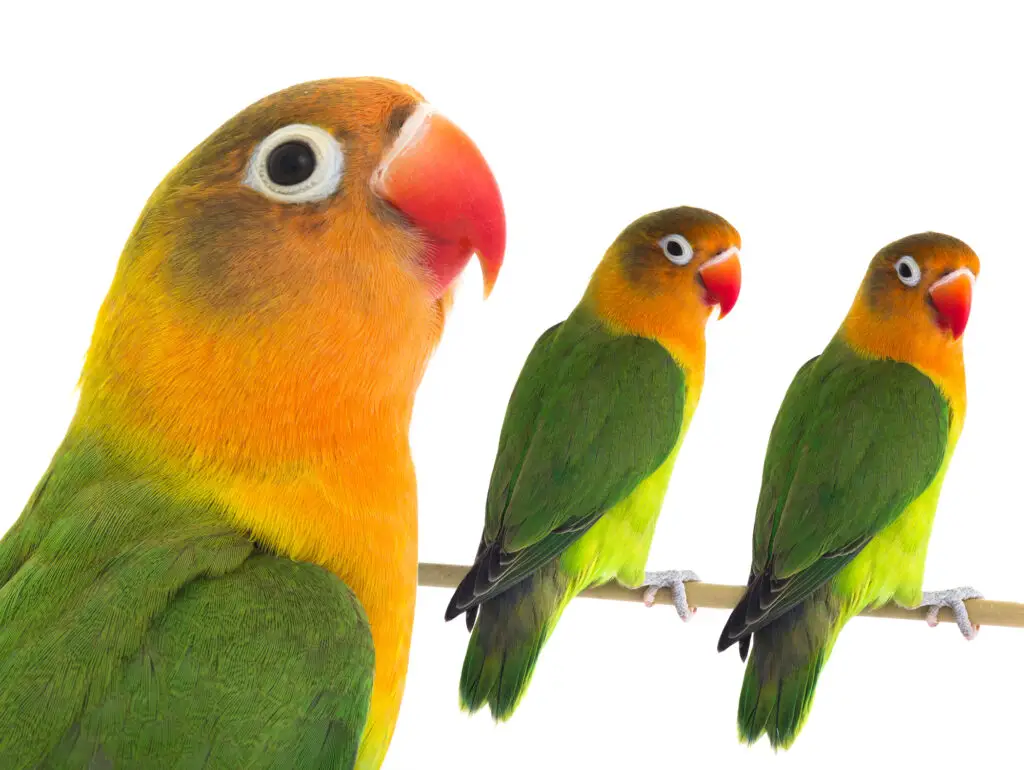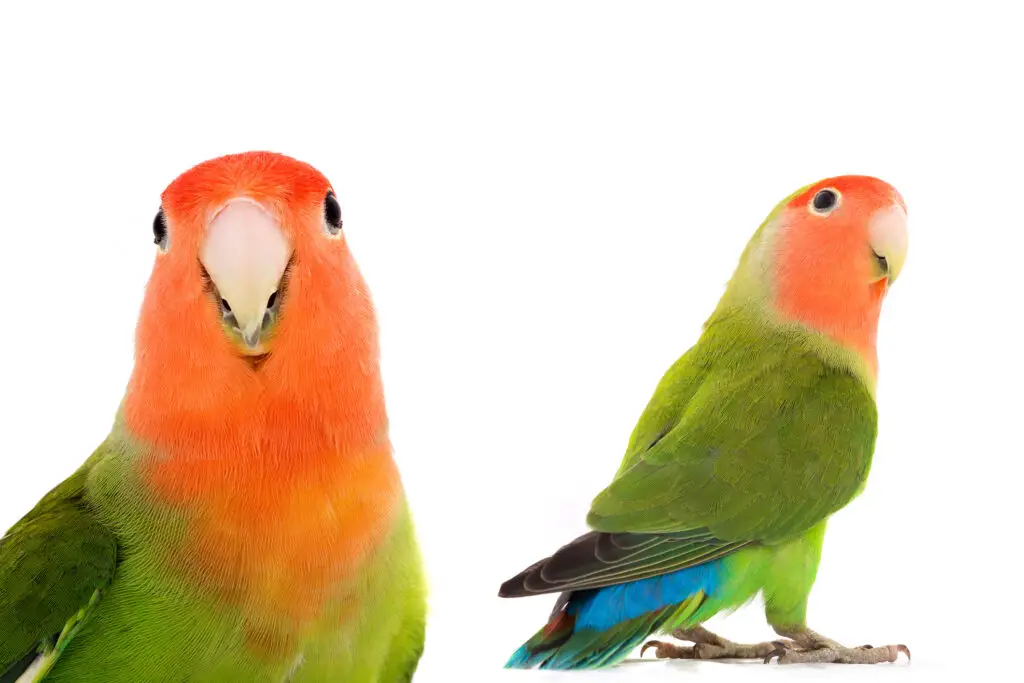Fruits are one of the leading diets lovebirds have. However, not all fruits are suitable for your feathered companions. Certain fruits, such as avocados, the seeds and pits of apples, nectarines, apricots, and some berries, are toxic to birds.
One topic of debate when it comes to feeding lovebirds is whether or not they can safely consume strawberries. So, in this article, we will answer the question, “can lovebirds eat strawberries?”
Key Takeaways
This article will discuss the following:
- Is strawberry safe for a lovebird’s consumption?
- Are processed strawberries edible for lovebirds?
- How to feed lovebirds with strawberries
- Are fruits the only part of the strawberry plant a lovebird can eat?
- The benefits of providing a lovebird strawberry
- The adverse effects of excessive strawberries on birds
- The number of strawberries a lovebird can consume and how often they can eat it
Lovebirds can eat strawberries as long as you feed them sparingly. Strawberries should be a treat, not part of a lovebird’s main diet. Strawberries are high in acid, so too much can cause gastrointestinal issues in birds.
If you are wondering what you should feed your lovebirds next, strawberries are one of the best choices. This article will discuss everything you need to know about feeding your feathered companion this fruit.
Can Lovebirds Eat Strawberries?

Can you feed lovebirds strawberries? It is common knowledge for bird enthusiasts that some berries are toxic to our avian friends. Some fruits and berries can cause minor health issues to birds, while others can result in more severe effects or even death.
For this reason, some birdkeepers are unsure whether they should add strawberries to their lovebirds’ diet.
Can You Feed Your Lovebirds Strawberries?
Strawberries are nutritious, making them an excellent snack for your lovebirds. However, they are also high in sugar, which can cause diarrhea and gastrointestinal problems for your birds.
This fruit is also mildly acidic. For this reason, it can upset your lovebirds’ stomachs if you feed them too much. That said, strawberries are a nutritious fruit that lovebirds can eat as a snack, not as a large part of their diet.
If given sparingly, strawberries are a great source of:
- potassium
- manganese
- vitamin C
- vitamin B9
Strawberries are also high in fiber. Fiber is vital for keeping gut bacteria healthy, so consuming strawberries from time to time can help your lovebird’s digestive system.
According to a study by Rahul Raj et al., strawberries are 90.6 percent water. So, this fruit is an excellent snack if you want to keep your feathered companion hydrated.
Can Lovebirds Eat Processed Strawberries?
While strawberries are a safe snack for your lovebirds, there is a limit to how much they can eat. It is also worth noting that fresh strawberries are the best thing you can feed your pet. While canned and processed strawberries are not toxic for lovebirds, they are usually high in sugar and sodium. For this reason, they can have adverse effects on your birds’ health.
The only processed strawberries you should feed your lovebirds are dried strawberries. They contain no preservatives and added sodium or sugar, making them highly safe for consumption. Since dried strawberries no longer have water, they will not go off as quickly as fresh ones. Dried strawberries are also lower in acid than fresh ones, so they will not easily upset your feathered companion’s stomach. Meaning you can feed your lovebirds more strawberries if they are dried. However, some dried strawberry products have added sugars, so you must check the label before providing dried strawberries to your bird.
Organic Strawberries Are The Best Option
You can feed your lovebirds with regular, store-bought strawberries as long as you ensure that they are organic. Strawberry farmers spray their produce with pesticides to prevent insects from destroying them. As a result, the surfaces of the fruits still have traces of pesticides on them once they reach the stores.
While your lovebirds can still eat these strawberries, you should always opt for the organic ones if they are available. Organic strawberries do not have chemicals or pesticides. For this reason, you do not have to worry about harmful compounds harming your feathered companion.
Feeding your lovebirds non-organic strawberries once or twice is harmless. However, a study by Ana Lopez-Antia, et al. found that birds fed with pesticide-treated seeds display gastrointestinal distress.
For this reason, extended exposure to strawberries treated with pesticides can result in various health problems for your lovebirds.
In addition, you should never feed your lovebirds a strawberry that is starting to go bad, even if half of it still looks edible. The reason is that it contains bacteria, which can cause your pet to become sick.
How Do You Give Strawberries To Birds?

Giving strawberries to your lovebirds as a snack would be best, not their regular diet. For instance, if you train your feathered companion to perform tricks, you can use strawberries as their treat. Here’s how you can give strawberries to your lovebirds:
Whole Fruit
The best way to feed your lovebirds with strawberries is to give them the whole fruit. If you cannot get organic strawberries, you can provide them with the normal ones as long as you wash them thoroughly to remove any remaining pesticides. This way, your lovebird can safely enjoy its strawberry even if it is not organically grown.
Your lovebird will enjoy picking on the fruit as soon as you give it one. However, this bird can be a messy eater, so you have to prepare to clean its cage every time you feed it.
Mixed With Seeds
You can also dice your strawberries and mix them with your lovebird’s food. This way, you can better control the number of strawberries you include in your feathered companion’s diet.
You may also leave some strawberry chunks in your lovebirds’ feeding dish. This feeding method is less messy than giving them the entire fruit, which means you will have fewer things to clean.
Strawberry Water
Another way you can feed your lovebirds with strawberries is to mix them with water. Get a strawberry, crush it on your pet’s drinking dish, and mix it with clean water. You can encourage your lovebirds’ hydration by making them smell the strawberry water’s sweet aroma.
After feeding your lovebird with strawberries, you should always clean its feeding dish and remove any leftovers from its enclosure. The reason is that the sweet scent of this fruit can attract ants and flies, potentially harming your feathered companion.
Are The Fruits The Only Strawberry Part A Lovebird Can Eat?
In the wild, lovebirds do not only eat fruits. Instead, they also feed on the greens of plants and seeds. For this reason, the fruit is not the only part of a strawberry plant that you can provide your feathered companion:
Strawberry Leaves
Lovebirds are small and curious birds. For this reason, you can try giving them some strawberry leaves along with the fruit itself. Your feathered companion will try picking on the leaves; if it likes its taste, it will consume it along with the fruit.
Strawberry leaves contain high amounts of vitamin C, calcium, iron, and tannins, which benefit your bird’s health.
However, washing the strawberry leaves thoroughly before offering them to your lovebird is essential. This way, you can ensure that no insects or pests that can harm your pet are sticking to the leaves.
Strawberry Seeds
The seeds of a strawberry also contain nutrients. According to a study by Katarzyna Grzelak-Błaszczyk et al., strawberry seeds are a good source of dietary fibers, flavonols, and ellagitannins.
Lovebirds will pick out the seeds from the strawberry fruit first before they eat the flesh. That said, allowing your pet to consume strawberries and their seeds from time to time can keep them healthy.
The Health Benefits Of Strawberries For Lovebirds
Strawberries are not only a delicious snack for lovebirds. However, the taste is not the only thing your feathered companions will enjoy. Instead, they will also get various health benefits from consuming strawberries.
Boosts Immune System
According to a study by the International Journal Of Poultry Science, vitamin C can enhance a bird’s immune response. It helps your lovebirds fight off infections and diseases, allowing them to stay healthy.
Even better, the vitamin C content of strawberries is a potent antioxidant that can improve your birds’ skin. It nourishes your lovebirds’ blood, thus regulating their blood pressure. Feeding your feathered companion with strawberries after it consumes excessive sodium also prevents it from experiencing gastrointestinal issues.
Improves Blood And Tissue Health
Vitamin C alone can improve your lovebirds’ blood. However, strawberries also have vitamin B9, which can further nourish your birds’ blood. Folate is crucial in constructing new and healthy blood cells and tissues.
For this reason, feeding your lovebirds strawberries will allow them to repair any muscle damage quickly.
Folate is also essential for birds to form uric acid, which is crucial if you feed them a high-protein diet. Uric acid is the waste product produced when your lovebirds digest protein. Failure to excrete uric acid can cause kidney problems in your birds, so feeding them strawberries is beneficial.
Improves Cognitive And Bodily Function
The potassium content of strawberries improves a lovebird’s cognitive and bodily functions. Potassium increases the blood flow to your pet’s brain, which enhances its intelligence. It also strengthens your bird’s physical health, thus allowing it to become more active.
Additionally, potassium works with vitamin C in preventing a lovebird’s sodium in the body from going beyond its normal level.
Helps Wounds Coagulate
Strawberries contain vitamin K, which is crucial in helping wounds and cuts heal. Vitamin K allows blood to clot. As a result, your lovebirds can quickly heal when they get wounded.
According to Harvard’s School Of Public Health, vitamin K helps build a lovebird’s bones. The bird’s body naturally produces osteocalcin, which needs vitamin K to make bone tissue.
Are There Any Negative Effects?
Feeding your lovebirds with strawberries from time to time will do them no harm. However, it is important to note that while these fruits are one of the healthiest treats you can provide your feathered companion, too many strawberries can also cause adverse effects.
Too many strawberries can cause your lovebird’s bowl to act up. As a result, it may experience an upset stomach and watery stools.
When feeding strawberries to your lovebird, you should first give it a small portion and observe how it will react. This way, you can ensure that your pet does not have an allergy to the fruit. If it does not show any adverse reaction, you can proceed to feed it with a small strawberry.
How Many Strawberries Can Lovebirds Eat?
A lovebird’s regular diet consists primarily of pelleted seeds. Some also feed on fruits, vegetables, leafy greens, and fresh sprouts. Fruits that are not high in acid are ideal for a lovebird’s regular consumption.
As mentioned, strawberries have a high acid content. For this reason, it is only ideal to feed your pet bird with it a couple of times a week. It would be best if you only fed an adult lovebird a small strawberry to ensure it will not irritate its bowel.
Can Lovebirds Eat Strawberries? Final Thoughts
Lovebirds feed on fruits and seeds, so they naturally eat any fruit once you offer them one. However, not all fruits are safe for a lovebird’s consumption, as some contain toxic compounds like cyanide. Fortunately, strawberries are safe for a lovebird’s consumption.
Lovebirds can eat strawberries. However, this fruit is high in sugar and acid, so it should only be an occasional treat.
These Articles May Also Interest You
- What Do Lovebirds Need?
- Can Lovebirds Eat Bananas
- 6 Things You Didn’t Know About Lovebird Singing and Song
- The US Lovebird Price Guide For 2023
- The Lovebird Vs. Parrotlet (And Why You Need To Know The Difference)
- Lovebird Colors Explained (You Won’t Believe This)
- Are Budgies Love Birds? (We Find Out)
- Raj, Rahul, Akansel Cosgun, and Dana Kulić. 2022. “Strawberry Water Content Estimation and Ripeness Classification Using Hyperspectral Sensing” Agronomy 12, no. 2. https://doi.org/10.3390/agronomy12020425. Accessed February 3, 2023.
- Lopez-Antia, Ana, Manuel E. Ortiz-Santaliestra, and Rafael Mateo. “Experimental Approaches To Test Pesticide-Treated Seed Avoidance By Birds Under A Simulated Diversification Of Food Sources.” Science of the Total Environment 496 (2014). DOI: https://doi.org/10.1016/j.scitotenv.2014.07.031. Accessed February 3, 2023.
- Grzelak-Błaszczyk, Katarzyna, Elżbieta Karlińska, Karolina Grzęda, Edward Rój, and Krzysztof Kołodziejczyk. “Defatted Strawberry Seeds As A Source Of Phenolics, Dietary Fiber And Minerals.” LWT 84 (2017). doi:10.1016/j.lwt.2017.05.014. Accessed February 3, 2023.
- Asli, Maziar Mohiti, Seyed Abdollah Hosseini, Houshang Lotfollahian, and Farid Shariatmadari. “Effect Of Probiotics, Yeast, Vitamin E And Vitamin C Supplements On Performance And Immune Response Of Laying Hen During High Environmental Temperature.” International Journal of Poultry Science 6, no. 12 (2007). https://citeseerx.ist.psu.edu/document?repid=rep1&type=pdf&doi=246bbe35d940fb350731d97e855f50f70a4fe822. Accessed February 3, 2023.
- Harvard T.H. Chan School Of Public Health. “Vitamin K.” The Nutrition Source (blog). https://www.hsph.harvard.edu/nutritionsource/vitamin-k/#:~:text=Vitamin%20K%20helps%20to%20make,to%20produce%20healthy%20bone%20tissue. Accessed February 3, 2023.




